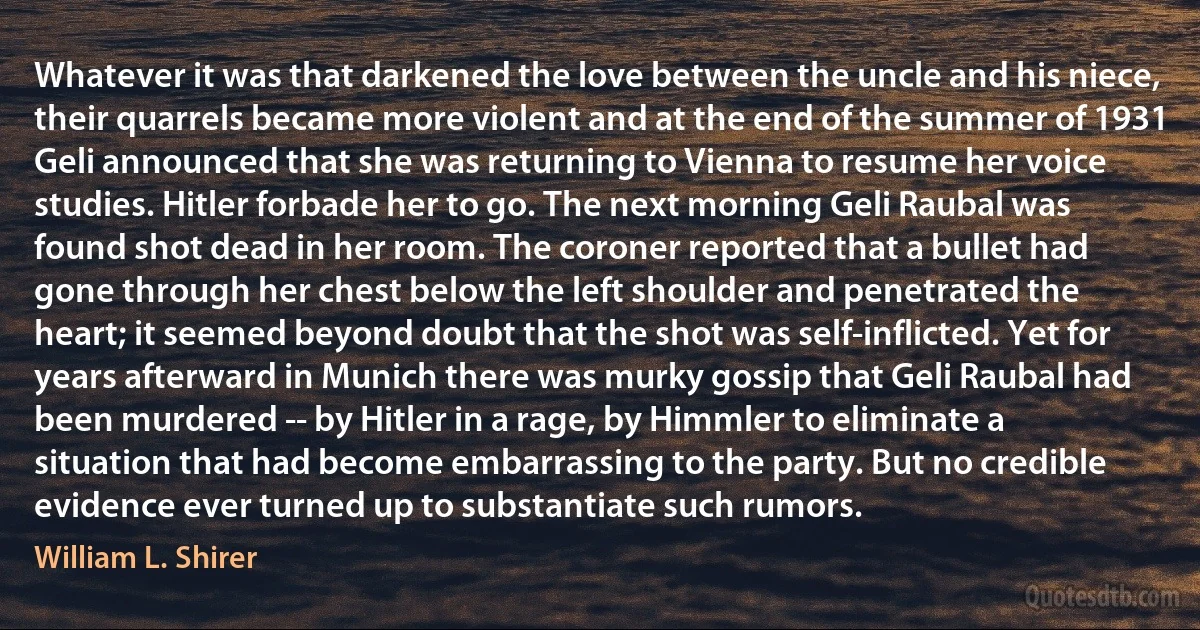
Whatever it was that darkened the love between the uncle and his niece, their quarrels became more violent and at the end of the summer of 1931 Geli announced that she was returning to Vienna to resume her voice studies. Hitler forbade her to go. The next morning Geli Raubal was found shot dead in her room. The coroner reported that a bullet had gone through her chest below the left shoulder and penetrated the heart; it seemed beyond doubt that the shot was self-inflicted. Yet for years afterward in Munich there was murky gossip that Geli Raubal had been murdered -- by Hitler in a rage, by Himmler to eliminate a situation that had become embarrassing to the party. But no credible evidence ever turned up to substantiate such rumors.
William L. ShirerRelated topics
beyond chest dead doubt embarrassing end found gossip heart left love morning next niece party resume room shot shoulder situation summer uncle voice whatever yet hitler years munich himmlerRelated quotes
[About whether critics have influenced his work:] None could have, because I don't read them. I doubt anyone does, except other critics. It seems like a sealed-off field with its own lieutenants, pretty much preoccupied with its own intrigues. I got a glimpse into the uses of a certain kind of criticism this past summer at a writers' conference – into how the avocation of assessing the failures of better men can be turned into a comfortable livelihood, providing you back it up with a Ph. D. I saw how it was possible to gain a chair of literature on no qualification other than persistence in nipping the heels of Hemingway, Faulkner, and Steinbeck. I know, of course, that there are true critics, one or two. For the rest all I can say is, "Deal around me.”.

Nelson Algren
Could it be possible, Hezekiah asked himself, that there was no room for both the faith and truth, that they were mutually exclusive qualities that could not coexist? He shuddered as he thought of it, for if this should be the case, they had spent their centuries of devotion to but little purpose, pursuing a will-o'-the-wisp. Must faith be exactly that, the willingness and ability to believe in the face of a lack of evidence? If one could find the evidence, would then the faith be dead? If that were the situation, then which one did they want? Had it been, he wondered, that men had tried what they even now were trying and had realized that there was no such thing as truth, but only faith, and being unable to accept the faith without its evidence, had dropped the faith as well?

Clifford D. Simak
The truth seems to be, that like many other geniuses, this Man of Mosses takes great delight in hoodwinking the world, - at least, with respect to himself. Personally, I doubt not, that he rather prefers to be generally esteemed but a so-so sort of author; being willing to reserve the thorough and acute appreciation of what he is, to that party most qualified to judge - that is, to himself. Besides, at the bottom of their natures, men like Hawthorne, in many things, deem the plaudits of the public such strong presumptive evidence of mediocrity in the object of them, that it would in some degree render them doubtful of their own powers, did they hear much and vociferous braying concerning them in the public.

Herman Melville
But today the fashion is to ascribe the extinction of Buddhism to the persecution of Buddhists by Hindus, to the destruction of their temples by the Hindus. One point is that the Marxist historians who have been perpetrating this falsehood have not been able to produce even an iota of evidence to substantiate the concoction. In one typical instance, Romila Thapar had cited three inscriptions. The indefatigable Sita Ram Goel looked them up. Two of these turned out to have absolutely no connection with Buddhist viharas or their destruction, and the one that did deal with an object being destroyed had been held by authorities to have been a concoction; in any event, it told a story which was as different from what the historian had insinuated as day from night.

Arun Shourie
The clear awareness of having been born into a losing struggle need not lead one into despair. I do not especially like the idea that one day I shall be tapped on the shoulder and informed, not that the party is over but that it is most assuredly going on-only henceforth in my absence. (It's the second of those thoughts: the edition of the newspaper that will come out on the day after I have gone, that is the more distressing.) Much more horrible, though, would be the announcement that the party was continuing forever, and that I was forbidden to leave. Whether it was a hellishly bad party or a party that was perfectly heavenly in every respect, the moment that it became eternal and compulsory would be the precise moment that it began to pall.

Christopher Hitchens
